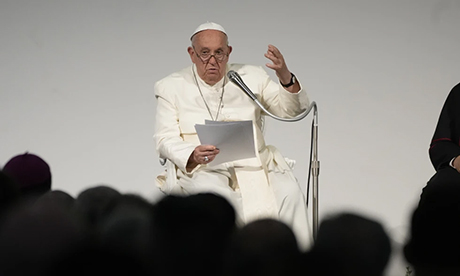The Vatican’s chief prosecutor is staunchly definding the integrity of the Holy See’s legal system.
The move comes following accusations that Pope Francis’ absolute power undermines defendants’ rights.
Prosecutor Alessandro Diddi’s defence comes as the Vatican tribunal finalises its written reasons for its December 2023 verdicts in the so-called “trial of the century”.
The tribunal convicted Cardinal Angelo Becciu and eight others of financial crimes related to a €350 million investment in a London property.
However the tribunal has yet to fully explain its decisions.
Diddi published an essay last month in the peer-reviewed journal Diritto e religioni (Law and Religion), responding to criticisms from two academics and lawyers representing some of the defendants.
Their critiques have raised more fundamental concerns about whether a fair trial is even possible in an absolute monarchy where the pope wields supreme legislative, executive and judicial power — and used it in this case.
Secret decrees
The lawyers argued that the two-year trial and preceding investigation were unfair, highlighting the Pope’s secret issuance of four decrees during the investigation. Critics claim these decrees altered Vatican procedures to favour prosecutors.
The four secret decrees, signed by the Pope in 2019 and 2020, granted Vatican prosecutors extensive powers including unchecked wiretapping and the ability to detain suspects without a judge’s warrant.
Diddi denied that the decrees impacted the suspects’ rights, arguing that they provided an “authentic interpretation” of Vatican norms by the Pope.
He maintained that the decrees merely “disciplined some particular aspects of the investigation” and did not compromise the guarantees offered to the suspects.
However Geraldina Boni, a canon lawyer for Cardinal Becciu’s defence, argued that the decrees violated the right to a fair trial since the suspects were unaware – until the trial – of the broad powers granted to prosecutors. One defendant was jailed for ten days during questioning.
Critics have questioned the tribunal’s independence. Judges swear obedience to the Pope who has the absolute power to hire and fire them at will.
Diddi asserted the full independence of the tribunal and its judges. He confirmed that the defence had all opportunities to present its case.
“Even though the Holy See isn’t a signatory to the European Convention on Human Rights, it doesn’t place itself outside the international community and doesn’t renege on the principles that inspire it” Diddi wrote.
Sources
Additional readingNews category: World.




